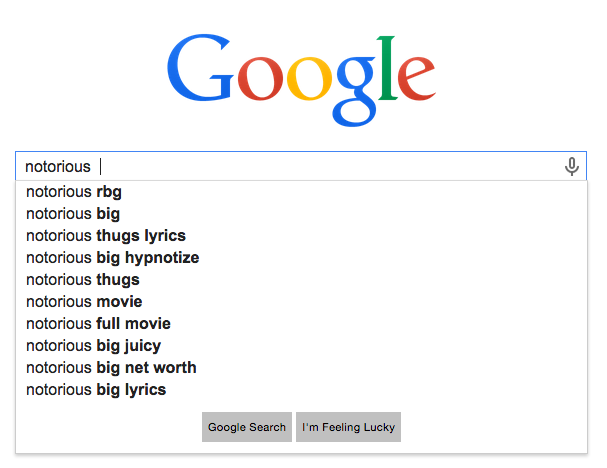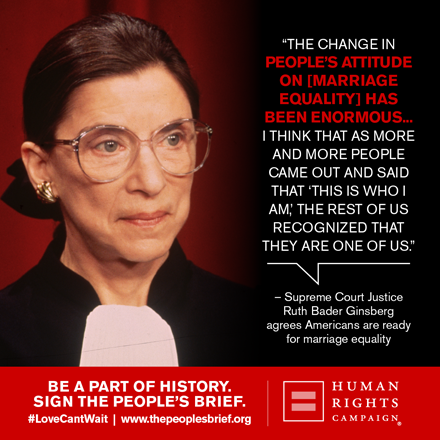 Justice Ginsburg has taken to her nickname, the Notorious R.B.G. She has told the story that her law clerks had to explain to her what it meant. Although, I doubt they explained to her how Christopher George Wallace gained the monicker Notorious B.I.G. The talented rapper, before he made it big (pun intended), was a high school dropout, arrested for weapons charges by the age of 17, spent 9 months in prison for dealing crack at 18, was arrested for threatening to kill two fans, and was later arrested again for drug and weapon charges. In any event, the name has stuck, such that a Google search for “Notorious” brings up RBG before BIG.
Justice Ginsburg has taken to her nickname, the Notorious R.B.G. She has told the story that her law clerks had to explain to her what it meant. Although, I doubt they explained to her how Christopher George Wallace gained the monicker Notorious B.I.G. The talented rapper, before he made it big (pun intended), was a high school dropout, arrested for weapons charges by the age of 17, spent 9 months in prison for dealing crack at 18, was arrested for threatening to kill two fans, and was later arrested again for drug and weapon charges. In any event, the name has stuck, such that a Google search for “Notorious” brings up RBG before BIG.
Yet, as this term progresses, the notoriety RBG is drawing to herself becomes less and less appropriate for the role of a Justice. In a recent interview with Bloomberg, Ginsburg is asked about the possible impact of the Court’s potential ruling on same-sex marriage.
Are you concerned, that if this Court, this year were to say that there is a constitutional right for same-sex couples to marry, that there are parts of the country that would not be able to accept or would not accept that decision.
The correct answer would have been, “I cannot answer that question because this case is currently pending before the Court.” Even accepting the premise of the question–that the Court will find a “constitutional right for same-sex couples to marry”–casts a weight on how RBG will rule. (As if her vote is in any doubt, but I still feign for the appearance of neutrality.”)
But, the Notorious RBG sought to add to her notoriety. I transcribe here her entire answer (only an excerpt is included here).
I think it is doubtful that it wouldn’t be accepted. The change in people’s attitude has been enormous. In recent years people have said this is the way I am. And others looked around and we discovered it’s our next-door neighbor. We’re very fond of them. Or it’s our children’s best friend, or even our child. I think that s more and more people came out and said ‘this is who, I am the rest of us recognized they are one of us.
Imagine if someone asked a Justice how people will react if the IRS rule in King was nullified? Oh wait. Ginsburg kinda answered that too.
Asked about the president’s legacy, Ginsburg pointed to the law, known as Obamacare, which she voted to uphold in the 2012 case.
“Our country was just about the only Western industrialized country that didn’t have universal health care for all of the people, and he made the first giant step in that direction,” she said. “That’s certainly one of the things he will be remembered for.”
These questions are premised on the Court ruling a certain way, and should not be answered. These are the type of policy arguments that appear in an amicus brief, not in the statements of the Justices, delivered at the Supreme Court.
Speaking of which, the Human Rights Campign is soliciting signatures for its “People’s Brief” with RBG’s quote from this interview. It is captioned, “Supreme Court Justice Ruth Bader Ginsburg agrees Americans are ready for marriage equality.” “Agrees”! Are they actually arguing that Justice Ginsburg has made up her mind, and agrees with HRC on this issue? We all know this is the case, but it is unseemly for advocates before the Court to make such representations in seeking signatures for an amicus brief!
 (As an aside, that photo of Ginsburg is about 20 years old. I think it is from the Court’s group picture in 1994. She isn’t even wearing a teacup jabot! Her first group picture with a doily was in 2006).
(As an aside, that photo of Ginsburg is about 20 years old. I think it is from the Court’s group picture in 1994. She isn’t even wearing a teacup jabot! Her first group picture with a doily was in 2006).
Ginsburg’s next comment compares bans on same-sex marriage to segregation laws.
There was a familiarity with people that didn’t exist in the beginning when the race problem was on the front burner. Because we lived in segregated communities. It was truly a we/they kind of thing. It is not so with the gay rights movement. I do not think it would take a large adjustment.
Here, she speaks entirely out of turn, and labels the animus behind bans on gay marriage with those about miscegenation. She compares the “race problem” with same-sex marriage bans. This is a seriously value-laden judgment that tars millions of Americans with the brush of bigotry–and potentially her own colleague, who is in an inter-racial marriage. But it is clear how Justice Ginsburg views the millions of Americans who not-too-long ago voted to amend state constitutions.
Yet Ginsburg’s argument also take on a salience I don’t think she appreciates. Footnote Four is often cited to explain why certain “discrete and insular” groups are entitled to heightened judicial reinforcement of their rights. If this is a doctrine the Court seriously (contestable), would the gay rights movement fit in? Though small in number, is this a group that lacks the political power today to advance their causes through the political process? This issue came up in February of 2012 when the federal district court in California invalidated DOMA. Whatever the argument was about the political clout of the gay-rights movement in February of 2012, as acknowledged by RBG herself, three years later it is much, much stronger. This is a huge testament to the power and message of the gay-rights community, that people have (in staggering number) supported their causes. But it is a double-edged sword. With this heightened political power, the argument for a judicial intervention becomes much, much weaker, as the political process becomes a more viable option for change.
Ginsburg’s final comments should have been her first.
And of course we shouldn’t speak much more about this subject because one way or the other it will be decided before we leave town in June.
As she says this she smirks.
This isn’t the first time this term she has made comments that potentially warrant recusal. She previously made comments about Texas’s abortion laws, while they were on appeal to SCOTUS (here and here). The National Organization for Marriage has called on RBG to recuse in this case.
As I noted following Hobby Lobby in a post titled Ruth Bader Hubris, “After a certain point, it becomes difficult to separate Justice Ruth Bader Ginsburg and the Notorious RBG. As a cause célèbre, she is now beyond the reach of normal commentary on the Court.” If Justice Ginsburg is intent on staying on the bench, she should comport herself as a Justice, and stop talking about pending cases. Court watchers should stop fawning over her inappropriate comments, even if they agree with it.
Further, I’m amazed that people are praising the fact that a Justice came to the State of the Union so intoxicated that she fell asleep. So much for sober as a judge. The district judge for whom I clerked was so serious about this image, that he wouldn’t even drink a beer in public, lest someone accuse him of judging under the influence. Also, she has fallen asleep in years past, so either she has been drunk before, or she just doesn’t bother staying awake. I’m not sure which is worse. If most people feel asleep at work, due to intoxication, they would be fired. (Although I’m sure EEOC would sue for a violation of the ADA).
I hope people can put aside the celebrity, and recognize that one of the 9 most important Judges in the world is acting entirely inappropriately–and she doesn’t seem to care.
Update: In response to Rick Hasen, who asks me to compare RBG to Scalia, I post here a comment I made over the summer with respect to abortion:
What makes this comment so problematic is that she referred to a specific law that is currently before the 5th Circuit, and will be appealed to SCOTUS one way or the other. Scalia and GInsburg have talked about abortion and the death penalty ad nauseum for decades, but it was always framed in terms of the issues they discussed in their dissents–not specific cases that may come before the Court. RBG’s comments seem akin to Scalia’s comments about the pledge of allegiance while the Newdow litigation was making its way through the lower courts. Scalia did recuse there.
The same dynamic apply here. Scalia and Ginsburg can and do make comments about general issues, but Ginsburg directly addresses pending cases in a way that I deem wildly inappropriate. When Scalia did so, he recused in Newdow.
Update 2: A flashback to Dahlia Lithwick’s comments on Justice Scalia recusal in Newdow in 2003:
Is this brilliant jurist losing his mind? Is he so frustrated by 17 years of failure to sway an allegedly conservative court to his side on social issues that he no longer cares who he offends or how biased he may appear? Has he become so swept up by the Coulter/Limbaugh/O’Reilly game of court-bashing that he cannot see how damaging it is when played by a justice? Or is he running for elected office? What possesses Justice Scalia to eschew the reclusive public life of many justices, or at least the blandly apolitical public lives of most, to play the role of benighted public intellectual and knight gallant in the culture wars?
And, Scalia recused.